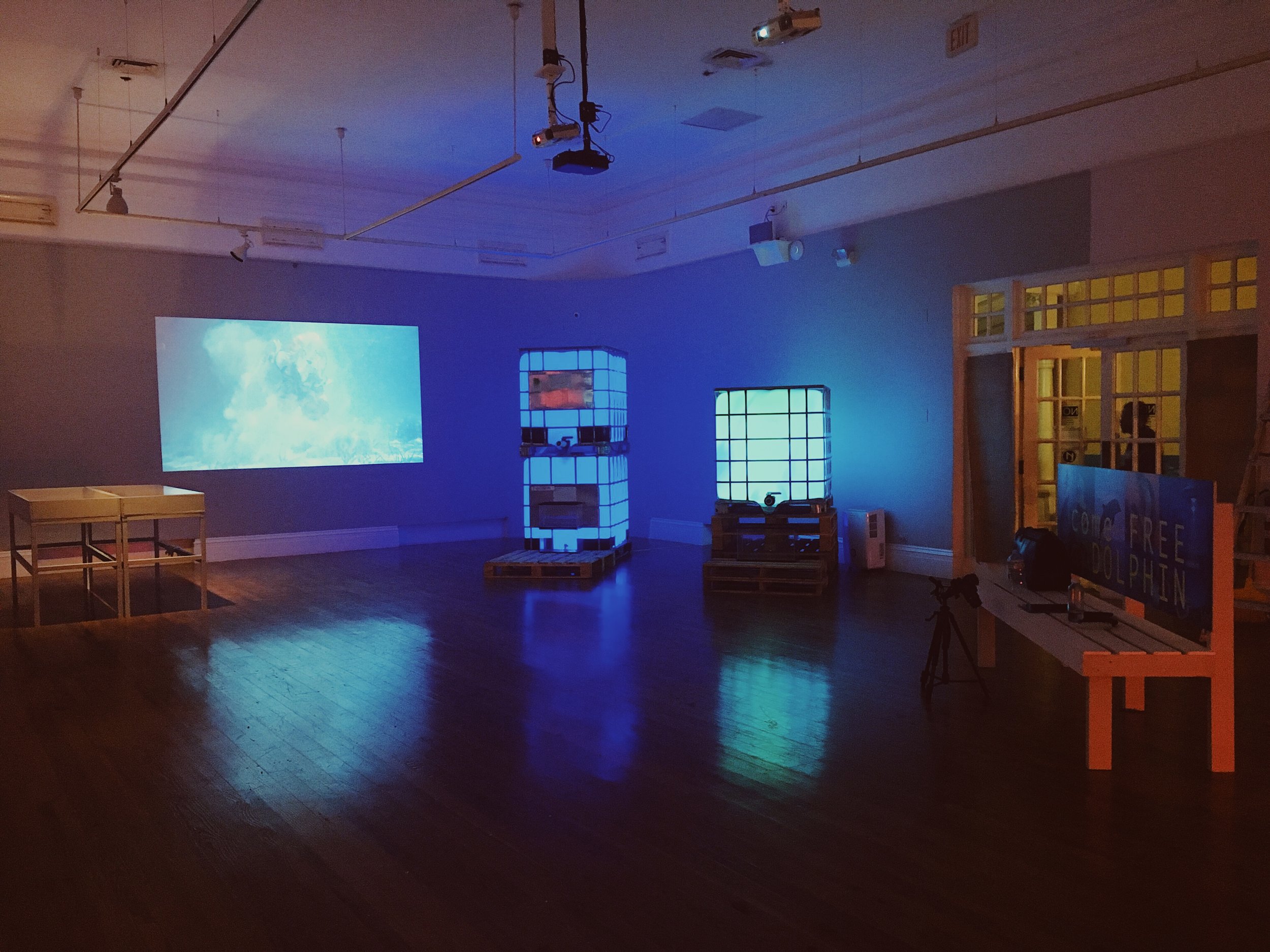
By Holly Bynoe.
The “Double Dutch” series supports the concept of bringing together local and regional artists, irrespective of where they are currently residing, to work with a group of ideas personal, political and otherwise crucial to the development of a contemporary Bahamian identity. These artists and collectives are often divided linguistically and geographically but are united by common historical, economic or practice-based conditions. For this reason, the National Art Gallery of The Bahamas (NAGB) pilot project attempts to create and maintain ties throughout the Caribbean and its more extensive diaspora.
This year’s chapter moves into its seventh iteration with “Hot Water,” which started over a year ago and culminated two months ago with a trip to Ragged Island–a small landmass of 9 square miles and a district in the southern Bahamas–to see the residual effects and the changes left in the wake of Hurricane Irma’s passage on September 8th, 2017. The meeting point for the collaborators were environmental and sustainably-focused concerns like global warming, climate change, rising sea levels and the loss of natural resources given the age of the Anthropocene– relating to or denoting the current geological age, viewed as the period during which human activity has been the dominant influence on climate and the environment.
The trip and the resulting collaborative exhibition was engendered by the meeting of the minds between two collectives—Expo 2020 (comprising Art, English and History students from University of The Bahamas or UB) and Plastico Fantastico (a group with partners living and working in the The Bahamas, Brazil, Cuba, Portugal, U.S. and the U.K.)—who both had an interest in creative practice as a way to generate sustainable solutions to environmental problems.
Expo 2020 is represented by Moriah Lightbourn, Ashley McClain and Ide Thompson with lead advisors, the educators Michael Edwards and Dr Ian Bethell Bennett, spearheading the UB team. Given its archipelagic reality, the islands of The Bahamas provide the theory and idea of linking cultural resilience with sustainability and economic survival. The work explores the confluence between oceans and land-based programmes to promote sustainable practices. Expo 2020’s contribution will dialogue with the international discussion around climate change and its impact on Small Island Developing States (SIDS) such as The Bahamas; understanding that sea level rise is a reality and has a detrimental impact on low-lying states that rely on fisheries and their relationship with the sea; appreciating the need for a robust national development project that identifies new possibilities in design. Observing the need for a new ideation process for the redevelopment of Ragged Island as a living and humanitarian lab, the Expo 2020 group designed new ways of seeing the conditions on the ground and the impact and implications that the trauma and the loss of material culture have on the nation.
Plastico Fantastico is a nomadic collective comprised of international artists and instigators. The collective’s philosophy and working methodologies directly respond to ecological issues site-specific to each location that they convene. Recently they have been researching and working in The Bahamas, where they exhibited at The Central Bank Gallery in April 2014—addressing issues of nationalism, identity, gender, conservation, and education.
For “Hot Water” members from the collective travelled to Ragged Island with the Expo 2020 team–an expedition taking five days on the mailboat MV Captain C working on sensitizing themselves to the geography of the Southern Bahamas; its relationship with trade, transport and a way of life that is very often invisible, since it is more common to think about The Bahamas as New Providence. The collective wrote a fictional story and drew inspiration from a woman scientist and through whose eyes they get closer to the tale of loss and vulnerability. Using moving images, photographs, creative writing and audio, they observe, look and transpose and build a visual cacophony of colours, movement and sound that shifts the architecture of thought and action in the space and the space itself.The question of loss about futures is provoked as we catch glimpses of traditions and rituals; once precious, fading away like a stolen memory.
“Hot Water” gives us another way to think about material culture and loss. The fragility of the ocean, resources and the land under threat, gives weight to how, as inhabitants, we can start shifting the conversation nationally and globally to speak about how deep these conversations about sustainability are. Through it, we come to understand more about the archipelagic state, and we bring the islands that are far-flung closer and back into our consciousness. We examine the development, or lack thereof, of the communities struggling to stay afloat and the icons and heroes of these spaces that remain stuck in a perpetual loop of potential and possibility.
“Hot Water” runs through Sunday, October 21st, 2018 and will be the only iteration this year. The NAGB will resume regular production of two iterations of Double Dutch in the summer of 2019.
